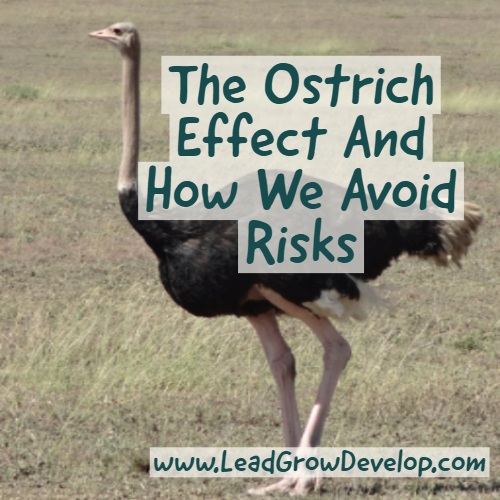When faced with upsetting news, how you do react? Are you curious and keep digging in for more information in order to find a solution? Or, do you just pretend the problem doesn’t exist and try to avoid risks?
When my Dad had his major stroke back in 2000, he went into a coma and had to undergo major brain surgery. He was in and out of hospitals often in that first year. After that event, whenever he would have a medical emergency, we had to argue with him to go to the hospital. He didn’t want to go for fear they would keep him there. He preferred ignoring the problem then hearing what the Doctors would have to tell him. Even though, not getting regular check-ups, and not knowing about his high cholesterol, helped contribute to his stroke in the first place.
We avoid getting an important medical test done, fearing bad results. We flip to the end of a thriller novel to ensure our favorite character is still alive (ok, I do that). We avoid information that may be pertinent, for fear it will also make us upset.
You see it often in comedies, the soon to be receiver of bad news knows what is coming and blocks his ears yelling, “Nah, nah, nah” to avoid hearing what’s to come.
These are examples of what has been referred to as, “The Ostrich Effect”, or Information avoidance.
In behavioral finance, the ostrich effect is the attempt made by investors to avoid negative financial information. The name is inspired from the legend that ostriches bury their heads in the sand to avoid danger. It was created to explain why investors check their portfolios much less when the Stock Market is down.
James Shepperd, a psychology professor from the University of Florida who studies information avoidance, says that there are 3 reasons why we avoid potentially unwanted information:
- It might suggest we do something we don’t want to do.
When I was younger, I had a hard time saying no. When I knew I was going to be asked a favor that I didn’t want to do, I simply made all kinds of excuses why I couldn’t see the person, including not taking some calls. I couldn’t say no, so instead, I opted for avoidance.
- It might bring out unwanted emotions, making us feel bad, or upset.
Take my previous example from above about my Dad avoiding taking care of his health for fear of what the Doctor might say.
- It might suggest we change our beliefs.
Realizing that something you believe is wrong, especially if it’s something important, can be an awful feeling. Sometimes, it can be easier to only read the news sources that back up your point and discredit any information that goes against your beliefs.
The problem with information avoidance is that in some instances, avoiding the conflict doesn’t solve it. In fact, it can escalate it. Avoiding certain difficult conversations that need to be had only makes it more difficult to have it later. Issues become bigger, and resentment grows.
We can be hungry for information only if it serves our purpose.
Is the Ostrich effect always wrong?
It depends on your reasoning behind avoiding information. Not looking at your financial investments when markets are down may keep you from selling in a panic, making it a rational decision. It is when you trade long-term gains for short term solutions that you are making yourself stuck.
Avoiding risks is good practice in many instances. However, avoiding tough situations that need to be taken care of, may be just putting things off. It’s not easy sometimes to face those challenges, but the longer you wait, the bigger the challenge could be.
What will you commit to no longer putting off this week?

